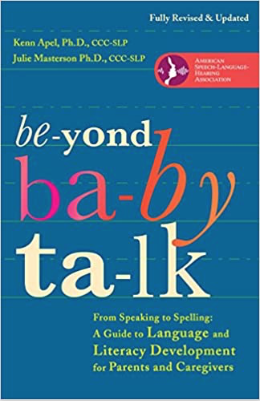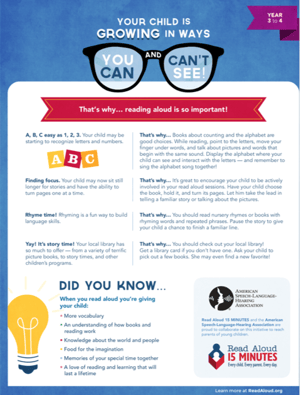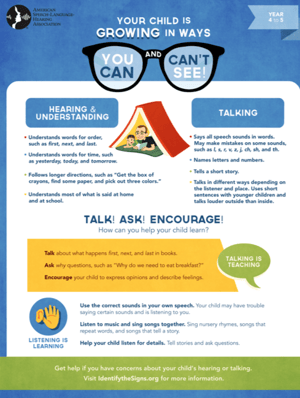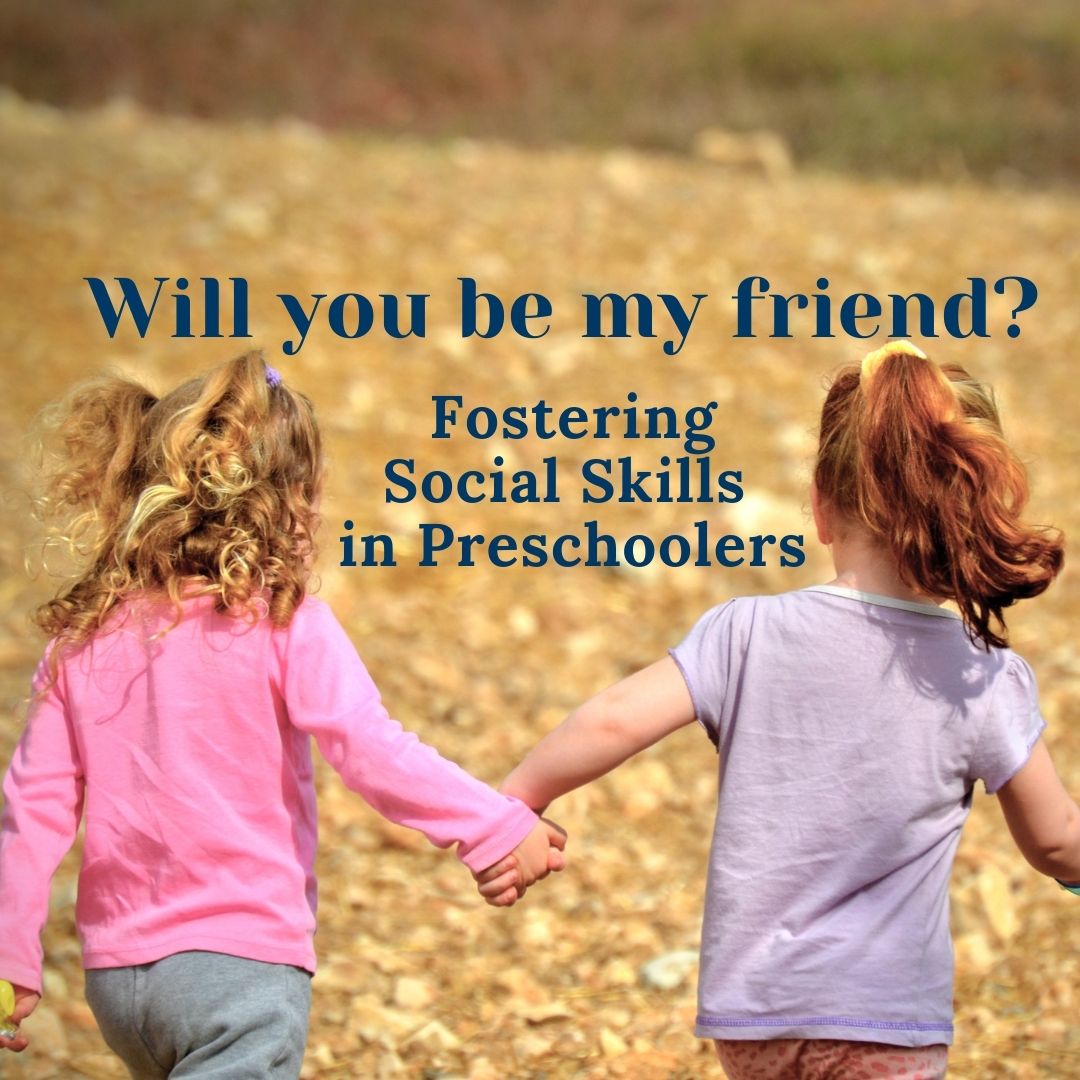As a certified Speech and Language Pathologist for the last 20 years, I have witnessed time and time again the importance of communication development at an early age. I have also seen how children are adversely affected by delayed communication development.
Speech and language skills not only make life easier in the preschool years with increased ease in communication between children and caretakers, these skills (or the absence of them) have a big impact on a child's literacy and overall academic experience. As parents, we are likely familiar with the frustration of not being able to understand our littles, but the frustration will not stop there if speech and language development are not given priority as young ones prepare for formal schooling. Consider this example: if a child cannot tell a simple story out loud as an incoming Kindergartener or first-grader, how will they be able to write a story?
Parents may sometimes hear from pediatricians or family members that it's okay to wait until formal schooling to address areas of concern regarding speech and language development. However, early attention and intervention is best for kids. I strongly encourage parents to learn and understand the various facets of communication development in order to best support their preschooler as they prepare for future academic success. Here are some things parents of preschoolers should keep in mind...
More Than Just Sounds and Words
An important item to know when talking about communication development is that it is not just sounds and words. A child may have a great vocabulary at a young age and be easy to understand when they speak, but that does not necessarily indicate that they are a strong communicator. There are three main aspects of communication development that parents need to be aware of:
Speech development is perhaps what many people think of when it comes to speech. It includes sounds, but it also includes speech fluency and the use of a child’s voice. Are they making the sounds they should for their developmental age? Are they experiencing periods of bumpy speech or stuttering? Is their voice hoarse? Too loud? Too quiet?
Language comprehension includes understanding vocabulary and basic concepts, being able to follow directions, understanding and answering questions, and recalling what someone has said.
Language expression includes the order, length and complexity of what a child says (which develops over time). It also includes vocabulary skills (can they label pictures and objects? Can they tell what words mean?). Expression also includes word endings and other grammar forms that we use when we speak. It also considers how we vary how we express ourselves based on others we are with and the situations we are in (social language or pragmatic skills).
Communication Development Benchmarks for Preschoolers
In regards to speech in general, the rule of thumb is that a three year old should be understood by a stranger 75% of the time, and a Kindergartener should be understood by a stranger nearly 100% of the time.
In regards to the sounds children are expected to make, the following guidelines are helpful:
- By age 3, a child should use P B M W N and H
- By age 4.5, a child should have T D K G Y and NG (“ing”)
- By ages 5-6 (Kindergarten), a child should have F V and SH CH J and L (but maybe with some errors)
- By ages 7-8, a child should produce S Z and S R and L blends, TH and R
As it pertains to language comprehension and expression, be aware that vocabulary and the complexity of what children say should increase regularly through this time period (ages 3-5). Students should know basic concepts (colors, shapes, most letters and number 1-10), be able to follow 2-3 step basic directions, ask and answer basic questions be able to tell how to do familiar routines (brushing teeth, getting ready for school), and be able to retell short stories and experiences in order by Kindergarten. They should understand most of what is said to them most of the time by ages 4-5.
Common Speech and Language Issues for Preschoolers
Perhaps the most noticeable language challenges for preschoolers are in their pronunciation of words. Many times speech sound errors happen in patterns - for example producing /k/, /g/ as /t/, /d/ or /s/ and /z/ as “th” or /l/ and /r/ as "w."
Sounds parents are often concerned about entering Kindergarten are R and TH, but these are still considering developing well into early elementary school (expected by ages 7-9) – many kindergarten students are not yet ready to make these sounds correctly, but can be encouraged by parent modeling and written examples. We do want children to hear these later developing sounds correctly so that they can spell and read them well.
Even if most of the above sounds are well developed, children may still trip over longer words with several syllables when they are ready for Kindergarten (example: “refidgelater” for “refrigerator”).
Some common expressive language development challenges include:
- Using object pronouns in the place of subject pronouns (“Her played with me” instead of “She played with me”)
- Overusing –ed (“breaked” instead of “broke”)
- Not including the “is” and “are” helping verbs (“She running” instead of “She is running” or “She’s running”
- Telling stories with limited details and/or telling stories out of order.
Common language comprehension breakdowns include:
- Difficulty following one or two step new directions
- Difficulty following routine multi-step directions
- Difficulty answering basic questions
- Difficulty understanding what someone has said to them
- Difficulty pointing to pictures when named.
Additional considerations: prolonged thumb-sucking can be a problematic habit for preschoolers as they develop speech and language skills. A lack of adjustment or flexibility in communication skills based on situations is also a challenge. Also, if a child yells often in play and around the home, this could damage a child's vocal folds and indicate the need for a regular hearing check with a pediatrician.
How to Foster Proper Communication Development at Home
There are a few basic ways that parents can foster communication development at home with their preschoolers, most of which are likely already happening in your home.
Read.
Reading aloud is crucial not just to literacy development but to language development.
Talk.
Talking is teaching! Having regular conversations and interactions with your child builds skills.
Model.
If you notice particular struggle areas for your child, model correct ways of communicating to address their specific challenge areas.
When to Seek Professional Speech-Language Intervention
The charts at the American Speech Language Hearing Association Hear and Talk Main Page tell you when most children who speak only one language will reach each milestone. Your child should master the skills listed by the top of the age range. Missing one skill in the age range does not necessarily mean a speech/language development problem is present. You should seek help if you answer "no" to most of the skills. Parents can use the ASHA ProFind for help contacting a local professional about their concerns.
Here are some additional handouts from ASHA that are helpful:
My top recommendation for a resource for parents is this book:
 This is an easy-to-read yet comprehensive guide to language and literacy development for parents. It is organized by age group so that you can easily navigate and learn about your child's age.
This is an easy-to-read yet comprehensive guide to language and literacy development for parents. It is organized by age group so that you can easily navigate and learn about your child's age.
When parents know the key components of communication development (speech, language comprehension, language expression) and what they typically look like at each age level, they are equipped to engage with and support their preschooler as they prepare for Kindergarten, literacy, and beyond. Talking, reading, and modeling appropriate communication are three basic ways that parents can support their preschooler's development. Being aware of common challenges preschoolers face in their language development helps parents have an idea of how their child's skills ought to be progressing, and provides a framework on which to further build those skills.
/Logos/Horizontal%20Academic%20Logo%20for%20Light%20Backgrounds.png)
/Logos/Horizontal%20Academic%20Logo%20for%20Dark%20Backgrounds.png)





